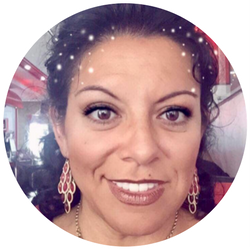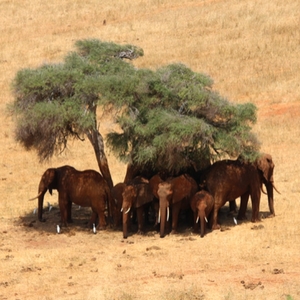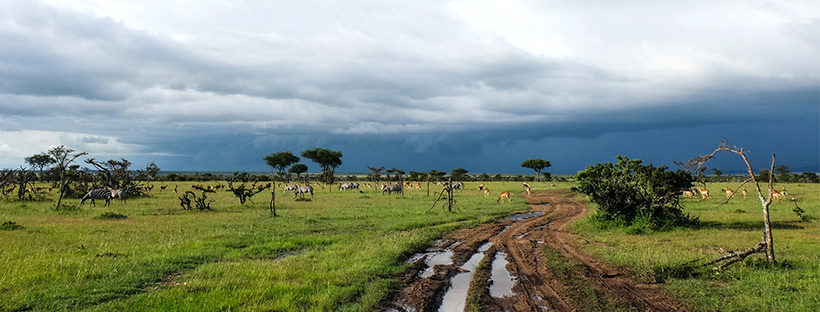 Marilyn is an expat in Kenya, building her life and business in a small city near the Maasai Mara National Reserve.
Marilyn is an expat in Kenya, building her life and business in a small city near the Maasai Mara National Reserve.
What’s your travel story?
I started coming to Kenya about four years ago. The first time, I was invited to come on a humanitarian trip. At the time, Kenya wasn’t even on my top 10 list. My visits got longer and more frequent. The presence of the people kept drawing me back to Kenya.
I love meeting people; I learn the best lessons through my relationships with others. I loved being fully present with people who are fully present with me. As I kept coming back to Kenya, I made connections and doors kept opening up for me. I started hosting my own trips.
Once I declared I was going to move to Kenya, things really did fall into place. I’m not a big city kind of girl, so I chose not to live in Nairobi. Narok is a smaller city, which doesn’t have as many amenities as Nairobi, but I still have good internet access, which I need for my business. And I knew some people here; it’s important for me to have people to hang out with it.
What do you do there?
I host cultural immersion trips called Soul Safaris through my business, Marilyn Knows. We do two-week projects in the community. Everything we do is sustainable, where the community has a say in what we do and they will sustain the project afterwards. People here can lead projects and they can draw on me as a resource. I can be “on purpose” here in ways that have immediate, profound effects. Money goes a lot further in this country.
We do anything that helps, like tree planting or a water service project. For example, there are generally not hand-washing stations set up at schools; so we install Tippy Taps. We’ve done empowerment workshops for girls on body awareness, moon cycles, and goal setting. Libraries are rare here, so we’ve started a couple of libraries. Sometimes I bring midwives who knowledge-share with the Maasai. We’ll go the elephant orphanage or the giraffe center. And then at the end we go on safari, which enables us to get up close and personal with the animals.
I’ve also helped women here start businesses that really support them and pay for their kids’ school fees. I support Days for Girls, hand-made, washable menstrual kits that enable girls to not miss days at school. Staying in school can help girls avoid early marriage and female genital mutilation, which is still prevalent in Narok County.
What’s it’s like there?
 I’m near the Maasai Mara National Reserve, which juts up against Serengeti National Park in Tanzania. Right now we’re in high season, which is when the crossing of the wildebeests occurs. Millions of wildebeests and zebras are crossing the Serengeti river . It never gets old; it’s always fascinating.
I’m near the Maasai Mara National Reserve, which juts up against Serengeti National Park in Tanzania. Right now we’re in high season, which is when the crossing of the wildebeests occurs. Millions of wildebeests and zebras are crossing the Serengeti river . It never gets old; it’s always fascinating.
Kenyans start the day pretty early, like 6 a.m. An hour-long walk to school is not uncommon. There are no washers or dryers here, so I have someone come and clean and do my laundry, which costs about $5/week. I’ll walk into town. Most Kenyans walk or take a motorcycle taxi for 50 cents, or a vehicle for $1.
What’s the food like there?
Everything is local, fresh, and simple. Kenya is very lush and green, so pretty much anything can grow year-round here: avocados, watermelon, tomatoes. Typical foods are kale, spinach, cabbage, rice and beans. There are different kinds of mangos, so one of them is almost always in season. In my county, a lot of wheat, maize and potatoes are grown. There are lots of cattle and sheep.
I eat very Kenyan, which has been incredibly healthy for me. I’ve dropped a fair amount of weight while being here. Also, the food here has more taste! The mangos and avocados, even the onions, are the best I’ve ever tasted.
Everything is cooked, so no salads! Most Kenyans spend a fair amount of time cooking. Ugali is a kind of doughy bread that you use to scoop up your meal. Githeri is a heavy dish of red beans, corns and sometimes peas boiled together. I modify it to be something like chili. Food is fairly bland here. I’ve learned to bring back spices on my trips away. When I cook for someone here, they often ask me to please not “put so many flavors in!”
The Maasai live on meat, milk and blood. Kenyans drink a lot of milk, but not cheese or butter. So cheeses are hard to find, and pork is hard to find and expensive.
What do you like best about being there?
The Maasai is one of the oldest tribes on the planet. The pace is so different, and there’s less resistance to connection. Kenyans have taught me patience, to enjoy a different pace of life. The slower pace. People being fully present with you. Some of my favorite days are sitting with my neighbors, shucking huge bags of peas.
Among the other things I like: We don’t have much light pollution. I love the way Kenyans speak. They speak in parables; it’s very poetic. I’m curvy, goddess-sized girl, which is more accepted here. Also, health care is so much more affordable here, and there are quite a few state of the art medical facilities, particularly in Nairobi.
What are some of your biggest challenges there?
Dust: Houses here are made of cement and block, and the windows are open because we don’t have air conditioning. So it gets dusty. Kenyans do a pretty solid housecleaning daily. They clean their shoes and their clothes often.
Connectivity: Internet and power sometimes go out. I have to make sure my solar panel is fully charged. It helps me stay connected to my adult daughter, who lives in the States. It’s still hard.
Kenya tends to be loud country in some ways. Much of the time, you hear donkeys, cattle, birds. And then other times, it’s really, really loud. In public transportation, there’s always music blaring. There’s a pop-up church across the street from me; the loudspeaker starts playing music at 6 a.m. on Sunday. Living in cement buildings with the windows open, sound really travels. I have a fan in my bedroom, which helps.
Traffic can be a patience builder, even in my town. There are a lot of political rallies that can slow things down.
There’s a bit of a caste system here. White people are considered on the top automatically. But Mzungu (white people) are not so common in my town.
I didn’t have a fridge or a stove my first year here. I had one little gas burner, so everything I ate was fresh. Now I have a two-burner stovetop and a small fridge, but still no oven. I miss my Crockpot and my Vitamix. And I miss bathtubs something fierce!
What’s it like for you to be a minority?
At first it was really tricky. People would just about break their necks, trying to take a look at me. I definitely stick out. It was quite a few weeks before I saw someone else who was not Kenyan.
In America I have never been considered white. As a kid in rural Utah with no other people of color, I stuck out. I’m brown; I’m a dash of Hispanic and Native American, a pinch of that. Still most people think I’m Hispanic or Greek. I consider myself a global citizen.
What’s your social life like now?
Being places where everyone speaks Swahili was an adjustment at first. There are 43 tribes; so most Kenyans speak English, Swahili, their mother tongue and one or two tribal languages. Now I’m very used to it. And now I speak some Maasai, which my sweetheart has been teaching me.
There are fairly lonely times here. In the States, I was used to going to networking events, lunch dates. There’s not really any night life here. Most often it’s my neighbors, my landlady. It’s been refreshing to meet my butcher, and the people I buy my produce from. I’ve learned a lot from some of my taxi drivers and their family members, being involved in school activities.
There are about 20 expats who live in this area and I sometimes hang out with them. The cultural norm is married people hang with married people and people hang out with their age-mates. There’s lot of separation of the sexes. I met my sweetheart during my travels through a cousin of his. We sparked up a friendship and it grew from there.
Kenya is definitely a bible-based country. Church is a social hub. Religion fascinates me, but I’m more spiritual than religious. It can be a bit uncomfortable, but it helps me get clear on my beliefs.
I’ve decided that I need to go to Nairobi at least once a month, even if it’s just for a day or a weekend. The nearest movie theater is about 2.5 hours from where I live, so I can’t just hop in a car and go to a movie. In Nairobi can go to the movies, go to a mall, have real pizza or a gelato, and just experience some things that are familiar.
What are some things that are very different from the States?
We have a common law marriage, with a wedding coming in the near future. Some of the elders would prefer not to see cohabitation out of marriage.
Kenyans often inherit and own quite a bit of land, as compared to Americans. Men can have hundreds of acres of land in Maasai culture.
Maasai do have quite a few nuances that I had to learn. Public displays of affection are not really acceptable here; the Maasai elders could even fine you for it. In public, sipping out of my sweetheart’s soda, now everyone would be looking to see if he drank after me, which would make him submissive, or eating off of his plate or him eating off of mine. Masai believe you should spit at a baby before you pick it up so it won’t be cursed.
What advice do you have for women thinking about moving abroad?
Make sure you have international health insurance, so you’re covered no matter where you travel in the world.
Also, I highly recommend joining Internations. It gives you access to every international chapter in the world. They have a lot of great subgroups (foodie, hiking, moms, business building, dancing). It’s enabled me to connect with people prior to going anywhere. You can get advice on wifi recommendations, phone service in different countries, what areas are affordable and safe. It’s so nice to have a little connection with someone, people that you can speak with, who are locals but not natives.
What’s next for you?
Kenya is a great hub for international travel. I’ve set my business up so I can be much more mobile and global. So in the next year, I’ll be traveling to a couple more countries, staying two months at a time. I can get great flight deals to India, Morocco, Dubai. I’d love to go to South Africa, Ghana, Egypt, Bali, Turkey, Greece. But Kenya will likely be my home base for the foreseeable future.
